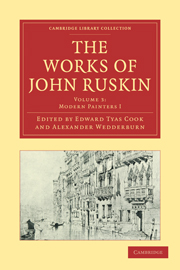Book contents
- Frontmatter
- Contents
- LIST OF ILLUSTRATIONS
- INTRODUCTION TO THIS VOLUME
- BIBLIOGRAPHICAL NOTE
- MODERN PAINTERS VOLUME I
- AUTHOR'S PREFACE TO FIRST EDITION (1843)
- AUTHOR'S PREFACE TO SECOND EDITION (1844)
- AUTHOR'S PREFACE TO THIRD EDITION (1846)
- AUTHOR'S PREFACE TO NEW EDITION (1873)
- AUTHOR'S SYNOPSIS OF CONTENTS
- PART I OF GENERAL PRINCIPLES
- SECTION I OF THE NATURE OF THE IDEAS CONVEYABLE BY ART
- CHAPTER 1 INTRODUCTORY
- CHAPTER II DEFINITION OF GREATNESS IN ART
- CHAPTER III OF IDEAS OF POWER
- CHAPTER IV OF IDEAS OF IMITATION
- CHAPTER V OF IDEAS OF TRUTH
- CHAPTER VI OF IDEAS OF BEAUTY
- CHAPTER VII OF IDEAS OF RELATION
- SECTION II OF POWER
- PART II OF TRUTH
- SECTION I GENERAL PRINCIPLES RESPECTING IDEAS OF TRUTH
- SECTION II OF GENERAL TRUTHS
- SECTION III OF TRUTH OF SKIES
- SECTION IV OF TRUTH OF EARTH
- SECTION V OF TRUTH OF WATER
- SECTION VI OF TRUTH OF VEGETATION.—CONCLUSION
- Appendix
- Plate section
CHAPTER VI - OF IDEAS OF BEAUTY
Published online by Cambridge University Press: 07 September 2011
- Frontmatter
- Contents
- LIST OF ILLUSTRATIONS
- INTRODUCTION TO THIS VOLUME
- BIBLIOGRAPHICAL NOTE
- MODERN PAINTERS VOLUME I
- AUTHOR'S PREFACE TO FIRST EDITION (1843)
- AUTHOR'S PREFACE TO SECOND EDITION (1844)
- AUTHOR'S PREFACE TO THIRD EDITION (1846)
- AUTHOR'S PREFACE TO NEW EDITION (1873)
- AUTHOR'S SYNOPSIS OF CONTENTS
- PART I OF GENERAL PRINCIPLES
- SECTION I OF THE NATURE OF THE IDEAS CONVEYABLE BY ART
- CHAPTER 1 INTRODUCTORY
- CHAPTER II DEFINITION OF GREATNESS IN ART
- CHAPTER III OF IDEAS OF POWER
- CHAPTER IV OF IDEAS OF IMITATION
- CHAPTER V OF IDEAS OF TRUTH
- CHAPTER VI OF IDEAS OF BEAUTY
- CHAPTER VII OF IDEAS OF RELATION
- SECTION II OF POWER
- PART II OF TRUTH
- SECTION I GENERAL PRINCIPLES RESPECTING IDEAS OF TRUTH
- SECTION II OF GENERAL TRUTHS
- SECTION III OF TRUTH OF SKIES
- SECTION IV OF TRUTH OF EARTH
- SECTION V OF TRUTH OF WATER
- SECTION VI OF TRUTH OF VEGETATION.—CONCLUSION
- Appendix
- Plate section
Summary
Definition of the term “beautiful.”
Any material object which can give us pleasure in the simple contemplation of its outward qualities without any direct and definite exertion of the intellect, I call in some way, or in some degree, beautiful. Why we receive pleasure from some forms and colours, and not from others, is no more to be asked or answered than why we like sugar and dislike wormwood. The utmost subtlety of investigation will only lead us to ultimate instincts and principles of human nature, for which no farther reason can be given than the simple will of the Deity that we should be so created. We may indeed perceive, as far as we are acquainted with His nature, that we have been so constructed as, when in a healthy and cultivated state of mind, to derive pleasure from whatever things are illustrative of that nature; but we do not receive pleasure from them because they are illustrative of it, nor from any perception that they are illustrative of it, but instinctively and necessarily, as we derive sensual pleasure from the scent of a rose. On these primary principles of our nature, education and accident operate to an unlimited extent; they may be cultivated or checked, directed or diverted, gifted by right guidance with the most acute and faultless sense, or subjected by neglect to every phase of error and disease.
- Type
- Chapter
- Information
- The Works of John Ruskin , pp. 109 - 111Publisher: Cambridge University PressPrint publication year: 2010First published in: 1903

